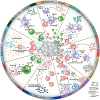Learning from the microbes: exploiting the microbiome to enforce T cell immunotherapy
- PMID: 37799719
- PMCID: PMC10548881
- DOI: 10.3389/fimmu.2023.1269015
Learning from the microbes: exploiting the microbiome to enforce T cell immunotherapy
Abstract
The opportunities genetic engineering has created in the field of adoptive cellular therapy for cancer are accelerating the development of novel treatment strategies using chimeric antigen receptor (CAR) and T cell receptor (TCR) T cells. The great success in the context of hematologic malignancies has made especially CAR T cell therapy a promising approach capable of achieving long-lasting remission. However, the causalities involved in mediating resistance to treatment or relapse are still barely investigated. Research on T cell exhaustion and dysfunction has drawn attention to host-derived factors that define both the immune and tumor microenvironment (TME) crucially influencing efficacy and toxicity of cellular immunotherapy. The microbiome, as one of the most complex host factors, has become a central topic of investigations due to its ability to impact on health and disease. Recent findings support the hypothesis that commensal bacteria and particularly microbiota-derived metabolites educate and modulate host immunity and TME, thereby contributing to the response to cancer immunotherapy. Hence, the composition of microbial strains as well as their soluble messengers are considered to have predictive value regarding CAR T cell efficacy and toxicity. The diversity of mechanisms underlying both beneficial and detrimental effects of microbiota comprise various epigenetic, metabolic and signaling-related pathways that have the potential to be exploited for the improvement of CAR T cell function. In this review, we will discuss the recent findings in the field of microbiome-cancer interaction, especially with respect to new trajectories that commensal factors can offer to advance cellular immunotherapy.
Keywords: CAR T cell; cancer immune cell therapy; immunology; immunotherapy; microbiome.
Copyright © 2023 Staudt, Ziegler-Martin, Visekruna, Slingerland, Shouval, Hudecek, van den Brink and Luu.
Conflict of interest statement
ML, MH, and AV are inventors on a patent application related to the use of pentanoate that has been filed by Philipps-University Marburg and Julius-Maximilians University Würzburg WO2021/058811A1. MH is inventor on patent applications related to CAR T cell manufacturing. MH is listed as an inventor on patent applications and granted patents related to CAR-T technologies that have been filed by the Fred Hutchinson Cancer Research Center, Seattle, WA and by the University of Würzburg, Würzburg, Germany. MH is a co-founder and equity owner of T-CURX GmbH, Würzburg, Germany. MH received honoraria from Celgene/BMS, Janssen, Kite/Gilead. MvdB has received research support and stock options from Seres Therapeutics and stock options from Notch Therapeutics and Pluto Therapeutics; he has received royalties from Wolters Kluwer; has consulted, received honorarium from or participated in advisory boards for Seres Therapeutics, Rheos Medicines, Ceramedix, Pluto Therapeutics, Thymofox, Garuda, Novartis (Spouse), Synthekine (Spouse), Beigene (Spouse), Kite (Spouse); he has IP Licensing with Seres Therapeutics and Juno Therapeutics; and holds a fiduciary role on the Foundation Board of DKMS (a nonprofit organization). The remaining authors declare that the research was conducted in the absence of any commercial or financial relationships that could be construed as a potential conflict of interest.
Figures


Similar articles
-
Tumor microenvironment and CAR-T cell immunotherapy in B-cell lymphoma.Eur J Haematol. 2024 Feb;112(2):223-235. doi: 10.1111/ejh.14103. Epub 2023 Sep 14. Eur J Haematol. 2024. PMID: 37706523 Review.
-
The Potential Role of the Intestinal Micromilieu and Individual Microbes in the Immunobiology of Chimeric Antigen Receptor T-Cell Therapy.Front Immunol. 2021 May 31;12:670286. doi: 10.3389/fimmu.2021.670286. eCollection 2021. Front Immunol. 2021. PMID: 34135898 Free PMC article. Review.
-
Improving CAR-T immunotherapy: Overcoming the challenges of T cell exhaustion.EBioMedicine. 2022 Mar;77:103941. doi: 10.1016/j.ebiom.2022.103941. Epub 2022 Mar 15. EBioMedicine. 2022. PMID: 35301179 Free PMC article. Review.
-
Relapse after CAR-T cell therapy in B-cell malignancies: challenges and future approaches.J Zhejiang Univ Sci B. 2022 Oct 15;23(10):793-811. doi: 10.1631/jzus.B2200256. J Zhejiang Univ Sci B. 2022. PMID: 36226535 Free PMC article. Review.
-
Involving stemness factors to improve CAR T-cell-based cancer immunotherapy.Med Oncol. 2023 Oct 1;40(11):313. doi: 10.1007/s12032-023-02191-7. Med Oncol. 2023. PMID: 37779152 Review.
Cited by
-
Fungi and cancer: unveiling the complex role of fungal infections in tumor biology and therapeutic resistance.Front Cell Infect Microbiol. 2025 Jun 10;15:1596688. doi: 10.3389/fcimb.2025.1596688. eCollection 2025. Front Cell Infect Microbiol. 2025. PMID: 40557321 Free PMC article. Review.
References
Publication types
MeSH terms
Substances
Grants and funding
LinkOut - more resources
Full Text Sources

